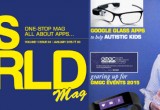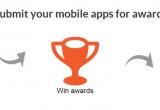
The January 2015 issue of Apps World Magazine features a cover story and 4 page spread dedicated to The Best Mobile App Awards and its founder, Eric Solan. Eric Solan is a 32 year old Developer and Entrepreneur from New Jersey. He has worked for various tech startups and is the Founder of The Best Mobile App Awards.
How did you come up with the idea to create BestMobileAppAwards.com?
Since the web’s inception in 1990, websites have been the primary vehicle for people to transfer data, share information and communicate. In 2008, the first mobile apps began arriving on the scene and this new technology quickly took the world by storm. Mobile apps allowed users to take all the things they love about the internet and put it in their pocket.
Since websites have a natural momentum built over the 25 years of existence, there exists an organic competition between companies and individuals to have the best website. To highlight this, hundreds of websites exist that compare and contrast what they consider to be the best websites in the world.
Early on, we saw a need to give mobile apps the same treatment: we felt there needed to be one central authority to highlight the best mobile apps available. Late in 2012, we set out on a journey to create The Best Mobile App Awards, an organization that would fill that role. Our beta site was built in Wordpress with the sole aim of detecting interest level. The beta site was quickly overwhelmed with heavy traffic and lots of nomination submissions, so we decided to custom-build a release version of the website. The current website was launched mid 2013 and the fresh mobile-friendly custom design was warmly accepted by our visitors.
How is BestMobileAppAwards different from other mobile app award programs of its kind?
Before the idea of a mobile app awards website began turning into something tangible, we spent months exploring other awards websites, from large companies like The Webby Awards to smaller review-based websites. What we found is most often the websites’ focus was primarily one-dimensional: they focussed simply on a directory of submissions.
Our strategy has always been to focus on the apps and developers themselves. As a web and mobile developer myself, I fully understand what a long journey it is to get a new mobile app recognized, trusted and into the public spotlight.
Very few apps blow up in popularity quickly. With this in mind, we have built most of the website around servicing our nominees and winners. We feature submissions as much as possible through our newsletters, on our homepage and in press releases. We have even built certain sections of our site out to highlight the Featured Developers or Featured Apps that deserve the spotlight.
What are the most important changes occurring in app development today?
Over the past few years, we’ve seen such a mass adoption of mobile technologies that it seems the markets for apps and games have become a bit saturated. Not only does that further highlight the importance of websites like The Best Mobile App Awards to bring the best apps to the forefront, but it has also created a desire for new technologies.
The most important changes we see now are the new integrations between mobile devices and other objects in our daily lives. I see home-automation as the current revolution. Using z-wave, bluetooth, wifi and other technologies, companies are slowly integrating everything from alarm systems to comfort settings onto our mobile devices. I think the goal here is that people one day have the remote control for everything in their daily lives right in their pocket.
Another buzz technology which I see as still having a long way to go is wearables. Tracking one’s health and fitness is one thing, but the future, for me, is incorporating daily routines with metrics so that one can go about their day without interruption, and when they have a few minutes, the data tracked by their wearables can show them how to improve themselves further and increase efficiencies. I’d like to see some wearable devices that can give people more advanced warnings signs of heart issues and panic attacks for example.
What are the best practices for building cross-platform mobile apps?
In a world of apple vs android vs windows phone vs webapps etc., I feel that a lot of weight is given to a “consistent experience” across devices and not enough focus is given to a “consistent experience” to the native functionalities of each device. What I mean is that mobile apps have branding, actions, functions and a general feel that many developers try to clone across all devices.
What sometimes is forgotten in this approach is that users get used to their device and its native functionalities and set up a sort of expectation that “when I do this, I should expect that.” A great, yet very simple example would be the “swipe-back” functionality that iOS focuses on since it lacks the native soft-key back button that Android devices have. Some mobile apps that are created on iOS might want to ignore the back button on Android and instead put in the swipe-back functionality to keep it identical to the iOS app. The problem is that Android users don’t expect this, and most of them won’t even know that functionality is there since they aren’t trained to look for it. It can confuse and even turn off users.
Back to the basics - if mobile developers leaned on native functionality for basic things like forms and button clicks, they can divert that extra time and attention towards the bigger features that really make a difference.
What's the first step someone with an idea for an app should take towards developing it?
Planning. Planning. Planning.
The tech world moves lightning fast. Time is money, and also the enemy since the more time you spend going “back to the drawing board” mid-development, the more time your competitors have to up the ante and beat you to market.
An old employer of mine used an acronym DIRTFT (pronounced dirt-foot). It stands for “Do it right the first time.” My strong advice to all mobile developers is to plan out every step that requires execution to the point where it almost seems redundant. With a solid execution plan, management becomes easier, development becomes quicker, and marketing strategies can become more evident. Changing anything mid-stride can set a development company back weeks or months.
What do you think are the most common mistakes developers make when turning their ideas into apps?
One of the more common mistakes I see in the market is the lack of time spent investigating one’s competition. With hundreds of millions of websites in existence, and millions of apps across the markets, chances are slim that one’s idea is 100% unique. Most mobile apps that really make it are mashups of old and new ideas, or rehashes of an antiquated process.
By investigating your competition, learning how their app works in and out and learning how their business works, publishers will begin to identify things they can do better and holes left in the market that need to be filled. Those holes can easily be exploited and turned into cool new features for your own app!
What are some of the most interesting or innovative apps you've seen on the market recently? What do you think sets them apart?
I’m a big fan of peripherals and the creative ways that mobile app developers integrate with them. Our studio has received some interesting gadgets and devices that pair with mobile apps. One of the most interesting devices we came across was a device sent to us by Osmo(https://www.playosmo.com/). It comes with a reflective mirror for the iPad camera, and game pieces to be used on a table-top in front of the device. Our team had a lot of fun playing addicting shapes and letters games with physical pieces that were detected by the app. The future of technology such as this is bright and has endless possibilities for education and gameplay.
Along the same lines is a product called Valedo which utilizes sensors and mobile gaming to alleviate lower back problems in users. The implication is that in the future, mobile apps and other wearable devices will be more accepted as alternatives to traditional physical therapy for smaller injuries and body aches. This is truly an exciting time for tech to directly help consumers!
What types of applications do consumers seem hungry for right now?
I think the two areas that I see the most growth in for mobile apps is Health/Fitness and Childrens apps. Because fitness happens to be such a hot topic in the same exact demographic that most mobile app users are in, companies have met this demand with very cool fitness tracking apps. The market seems to be eating this up.
Along the same lines, young parents who were born and raised in the age of technology seem to fully grasp the potential it might unlock in their little ones. I see a huge demand now for apps that help exercise the creativity in children and toddlers, and to reflect this we’ve run “Best App for Children” contests quite a few times in the past year and a half and have had a stellar response.
What mobile apps do you use the most?
Along-side the quintessential apps like Google Drive, MailChimp and Quickbooks Online, my typical day-to-day app usage is consumed with other apps that help me stay organized and get the job done. We have a custom-built mobile app to help me keep my finger on the pulse of The Best Mobile App Awards, and an under-utilized Google Keep stores all my to-do lists. The Slack app keeps project-related tasks moving forward, and the interface can make someone drool.
What devices (smartphone, tablet, laptop) do you own or use?
I have always been an Android user, mostly because of all of my Google integrations which I depend on every minute of the day. Since we do a lot of testing and reviewing of mobile apps in our studio, we have tons of devices floating around, from mini-tablets to Leap Frogs and Nabi Tabs. Peripherals and wearables have also started to invade our workflow, and these definitely add some spice to our day-to-day.
What are your plans for 2015 and beyond?
Growth is our number-one priority for 2015. We are currently exploring partnership opportunities with app publishers and directories to help their apps and clients gain recognition and exposure, which directly translates into app downloads. Also by garnishing relationships and helping developers and apps get exposed to as many sets of eyes as we can, we feel these relationships will consistently grow in a positive direction.
At the rate we’re growing, our aim is to host the first Best Mobile App Awards ceremony within the next two years. All nominees will be invited and winners will be announced and given the opportunity to accept awards and make an appearance on stage.
The future is bright for The Best Mobile App Awards.
Share:



